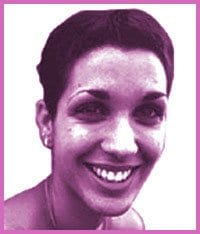It’s been years and I seem to have come full circle. Hand-holding is still the strongest statement I’ve ever made in public.
On my own I am just a woman, independently defying the aesthetic of a good woman. My sexuality is subject to speculation and suspicion. Although it is often assumed that I am queer, on my own I am the sinner without the sin. I am primarily a victim. As a threat, I am negligible. I am just a woman walking alone through the park on her way home. Not safe, but relatively so.
Travelling in twos can be more dangerous than travelling alone.
When I hold the hand of another woman, I take on a whole new identity. I am no longer just a woman. This simple gesture affirms my sexuality in the public eye. Now I am queer, a lesbian, gay. My potential as a victim has increased, because my potential as a threat has increased. Women like us together in this way do pose a serious threat: to the men who can’t have us, to the institutions that won’t see us, to the nuclear family.
Our confidence is intimidating. It looks like we don’t care about how much of the population with whom we are forced to deal as we navigate a busy west-end street will voice or otherwise demonstrate their disapproval of us and the lifestyle it is believed we are leading.
I haven’t always been a hand-holder. There was one mom and three of us and I’d rather wander than fight with my sisters. I didn’t like the idea of being connected to someone else, having to make joint decisions about how fast to go or which side of the pole to walk on. I used to stray from the sidewalk to pick up rocks and cellophane and anything shiny. My parents used to call me a blue jay.
Even now I am often too busy looting through other people’s curbside castaways to maintain a good human chain. But I’ve learned to love the dialogue two human hands engage in.
Grabbing her hand when you’re too chicken to tell her how you feel. Hanging onto it when you’re too angry to speak but still need to say, “Stay.” Gauging her nervousness by the extent to which she sweats against your palm.
When I first came out, holding hands with another girl in my suburban hometown was equivalent to going topless in downtown Toronto. You know the support is out there, but in the moment that you do it you feel absolutely alone. Although it didn’t seem like much next to news of bathhouses and protests, to me at 16, hand-holding was the heart of the revolution. It was the way in which I saw I could create or instigate change on the micro level of my life.
It is rare now that I’ll see another queer couple holding hands, which is not what I expected when I moved into the Bloor West Village where there are supposedly lots of queer people. Has hand-holding lost its charm?
It scares me to think that the likelihood of negative attention is the determining factor in a queer couple’s decision to hold hands.
If you are a hand-holder, you know how it feels when someone passes you and gives up that smile that says, “Good for you.” Most of us recognize that it takes guts to present ourselves as a queer couple outside of the usual queer hangouts. I remember one boy leaning towards me on a crowded Ossington route to whisper, “I love how you guys don’t care that everyone on this bus is staring at you.”
He was wrong. We do care, and some days it makes us want to scream or cry or both. But I figure it’s watch and learn, and although I hate being the arena for someone else’s overdue education, if it makes them more aware of our presence in this neighbourhood, it might be worth it.
I know it isn’t easy. Mothers will put themselves between you and their children. Stupid boys will slow their cars down to say, “Hey ladies, let’s see a little more!” People will nudge and nod and point fingers in your direction. People will stare like you’ve each got three eyes and two heads.
Try to stare back, or act like you have no idea what they’re staring at. It does get easier. I’ve discovered that the more at ease you appear together, the less likely it is that people will believe they can make you feel uncomfortable.
As long as it’s daylight and you’re not in some desolate place, you might feel unwelcome, but you won’t feel unsafe. And you’ll be saying something really important – yes, there are queers living and working and existing in this area.
Yes, there are queers choosing zucchinis at your supermarket and walking their dogs past your house. Yes, there are queers buying your ice cream and offering you their seats on the streetcar. Get used to it.

 Why you can trust Xtra
Why you can trust Xtra


